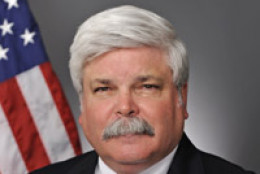Cybersecurity
-
It seems like the whole world is going mobile, and that includes the federal government. Agencies are using more and more apps for collaboration and productivity. But some apps increase the potential for exposing government data. To help you guard against these security risks, the National Institute of Standards and Technology is providing tips to the federal community for vetting third-party apps. Computer Scientist, Tom Karygiannis, joined Tom Temin on the Federal Drive to discuss the guidelines.
August 28, 2014 -
Chris LaPoint, vice president of Product Management for SolarWinds will discuss how his company can help your agency manage its information technology system. August 26, 2014
August 26, 2014 -
Labor Department Deputy CIO Dawn Leaf joins Federal News Radio for an online chat to discuss her priorities around IT modernization, data center consolidation and cybersecurity.
August 26, 2014 -
The Defense Information Systems Agency will begin to shake up its organizational chart in significant ways beginning on Oct. 1. But officials, so far, are reluctant to discuss the details.
August 25, 2014 -
New details emerge about the cyber attack against USIS. Hackers accessed personal information of Department of Homeland Security workers, including Social Security numbers, dates of birth and addresses. DHS will offer credit monitoring services to the affected employees.
August 25, 2014 -
Plans for the 11th annual Cybersecurity Awareness Month are underway at the Department of Homeland Security. DHS will partner up with the National Cyber Security Alliance to offer different events each week catered for federal agencies, individuals, and private companies. Week One will focus on the basics of cybersecurity. Starting in Week Two the topics get a little more specific. You can learn about how to develop more secure IT products, including cloud systems, and in Week Four the theme is cybersecurity for small and medium-sized businesses. DHS and the National Cyber Security Alliance hope the outreach will strengthen and build cybersecurity best practices for both private companies and federal agencies.
August 21, 2014 -
The Defense Information Systems Agency, which serves as the broker between Defense Department components and commercial providers of cloud computing services, says the certification standards it set for commercial providers may be too arduous for vendors. DoD also launched five pilots to test the use of commercial cloud providers and is reassessing how it develops cloud requirements.
August 21, 2014 -
The National Security Agency closed down an office dedicated to mobility, because devices and apps have become part of the fabric of everything the agency does. But NSA, like all agencies, still must figure out how to secure mobile devices using derived credentials.
August 21, 2014 -
Todd Weller of Hexis Cyber discusses the types of security threats federal agencies are facing on this week's Federal Tech Talk radio show.
August 19, 2014 -
The fast-growing number of devices connected to the Internet means enterprises need to rethink their approaches to cybersecurity. Cyber expert Melissa Hathaway says we're at a cyber inflection point. She's the president of Hathaway Global Strategies and former director of the Joint Interagency Cyber Task Force. She joined Tom Temin on the Federal Drive to discuss the top concerns for cybersecurity.
August 18, 2014 -
The service will test out a role-based authentication technology on an application in the MilCloud run by DISA. Frank Konieczny, the Air Force's chief technology officer, said the pilot could move into full production in six months. DoD is considering adding the role-based capability to the JIE framework.
August 15, 2014 -
The Army has thousands of personnel working full-time on cyber, but so far, those soldiers have no dedicated career path. That may be about to change.
August 15, 2014 -
Gary Wyckoff, the chief information officer of the Office of Naval Research, said ONR is on the cusp of putting several applications in the cloud. He said mobility is a more difficult road to travel.
August 14, 2014 -
Terry Halvorsen, DoD's acting chief information officer, is planning to change the way the military uses and manages its network. The Joint Information Environment is driving many of the modernization efforts across DoD.
August 14, 2014 -
A large chunk of the government IT workforce that's charged with implementing the Homeland Security Department's new continuous diagnostics and mitigation initiative still doesn't know much about it. The lack of awareness is most acute with agency inspectors general. But those that have pressed forward with CDM say their networks have already become more secure or less costly.
August 13, 2014








